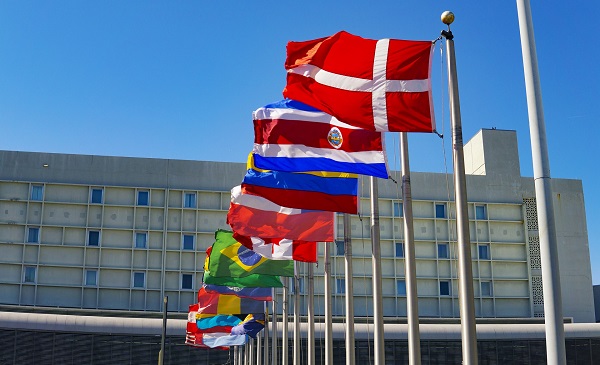What will you learn when you enroll in a graduate program in international relations, which happens to be one of the highest-paying master’s degrees? There are a lot of nuances and complexities in this interdisciplinary field of study. A few of the basic concepts that are most important in the field of international relations are international security, war and peace, international political economy, international trade and power and influence.
IMAGE SOURCE: Pixabay, public domain
International Security
Many of the essential concepts found in the study of international relations fit into the category of international security. For example, concepts of conflict, war and peace all fit into international security, as do topics in cybersecurity, homeland defense and terrorism.
Security in international relations often looks at the big picture – namely, war and peace. In some instances, tensions between nations can lead to violent conflicts and attacks. While the United States has not declared an all-out war since World War II, numerous armed conflicts have occurred in the decades since, claiming more than 100,000 American lives. That’s not counting the loss of lives sustained by allies or by countries on the other side of the conflicts.
Achieving and maintaining peace is an important aspect of work in international relations. Ending wars and other armed conflicts through diplomacy and peace treaty negotiations saves lives all over the world. Skillful, proactive use of conflict resolution strategies can prevent wars and armed conflicts from breaking out in the first place.
On the conflict and conflict resolution side, students might take classes in the use of force under international law, early warning and conflict, stabilization and peacebuilding. Other coursework pertaining to international security might include studies of intelligence, nuclear weapons, homeland security and security policies related to terrorism, cybersecurity and international organized crime.
The number of deaths that arise from an armed conflict doesn’t tell the full story of the scope of destruction, including physical disabilities, PTSD and other psychological harm and damage to buildings, structures and land that results from the fighting.
International Political Economy
What about international affairs beyond security? The category of international political economy focuses largely on the economic and financial aspects of global relations. Trade between countries is a big part of international relations. Increased trade among different nations leads to a thriving economy and increased globalization.
When these relations are good, countries export goods to one another and import them from one another. If these relationships between countries break down, trade sanctions and other penalties one nation imposes upon another can result.
While sanctions can be part of the strategies used for political power and control, trade breakdowns between nations – sometimes called “trade wars” – can be economically harmful to both countries, the United Nations Conference on Trade and Development reported. The unexpected stopping of streams of income from goods that can no longer be exported is bad for the producer, and the sudden lack of imported goods can lead to imbalances in supply and demand.
Other aspects of the international political economy include international finance and foreign direct investment.
Power
Power – who has it, how it is used (or abused), and how it is shared – is a major area of focus in international relations. Several concepts in international relations revolve around power and influence. The sovereignty of an independent state or nation refers to that state’s power to rule and regulate itself. Imperialism is the practice, dating back to ancient times, of extending a state’s or country’s power beyond its own borders, often by using force to conquer other nations. The balance of power, and any shifts that occur in that balance, determine how events play out on a global scale.
A balance of power means that any one nation or alliance of nations will be reluctant to take aggressive actions against other countries, even less powerful ones, due to the possibility of facing forceful reprisal from other nations.
International Relations as an Interdisciplinary Field of Study
There is a lot to learn when studying international relations. To make sense of it all, you will need to look at these concepts from different perspectives, approaches and academic disciplines. As a result, international relations is generally regarded as an interdisciplinary field of study, which often includes coursework in economics, history, politics, anthropology and sociology, according to U.S. News & World Report. Through classes in these different areas, students of international relations develop a thorough understanding of a variety of basic concepts and their applications in international affairs: diplomacy, globalization, international law and more.
Other courses in an international relations program encompass elements of other disciplines. An environmental policy course may draw on knowledge of science and technology, while a conflict negotiation course may integrate principles of psychology.
Additional Resources
Are There Different Areas of Study Under the Umbrella of International Relations?

